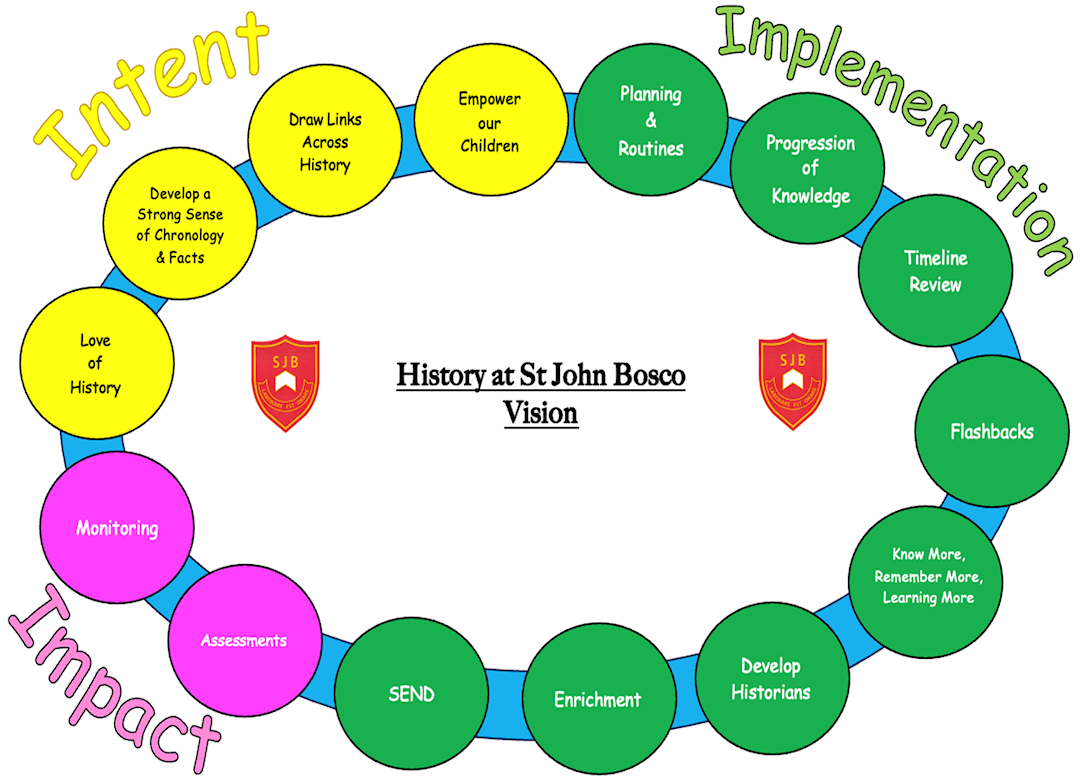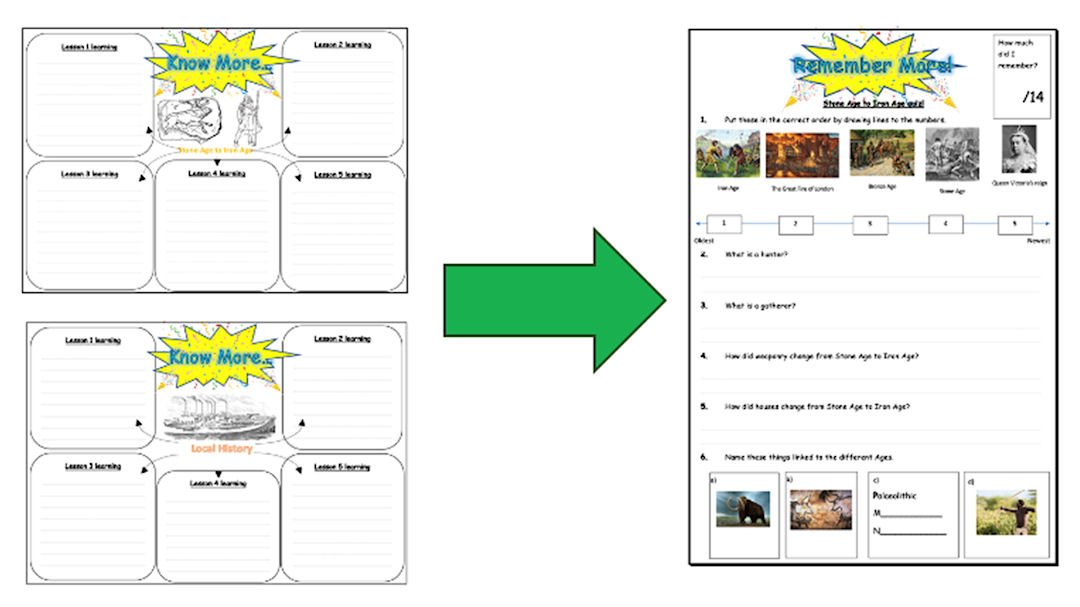History
Introduction
Our history curriculum strives for excellence and aims to cultivate a profound love for history in every child. Our curriculum is meticulously designed to develop budding historians who are not only knowledgeable but also passionate about the past. We believe that understanding history is pivotal to shaping informed and thoughtful individuals. Our goal is to enable children to apply their historical knowledge, fostering a comprehensive understanding of how past events influence the present and future and how events can occur simultaneously.
Our curriculum is rich and diverse, covering a wide range of time periods and significant individuals who have shaped our world. We place a strong emphasis on developing a robust sense of chronological knowledge, ensuring that children grasp the sequence of historical events and the connections between them. By engaging with our dynamic history curriculum, children will embark on a journey through time, exploring different cultures, eras and pivotal moments that have defined human civilization. We are committed to nurturing inquisitive minds and equipping them with the tools appreciate worldwide history.

Our comprehensive curriculum overview
Intent
At the core of our history curriculum at St. John Bosco lies a deep commitment to fostering a love of history in children.
We prioritise the development of a strong sense of chronology and factual understanding, recognising it as foundational to historical comprehension. By drawing connections across different periods and civilizations, we aim to provide a holistic understanding of history rather than teaching in isolation. Moreover, we empower children in their learning journey, encouraging them to be proactive learners who actively engage with the past, ask questions and seek answers.
Through our history curriculum, we strive to ignite curiosity, nurture critical thinking skills and instill a lifelong passion for exploring the rich tapestry of human history.
Implementation
Our school’s vibrant history curriculum commits to providing children with a rich and engaging learning experience that fosters a deep appreciation for the past. Our approach to teaching history is rooted in meticulous planning informed by the latest research, ensuring comprehensive coverage of British history and beyond. Through a combination of innovative teaching strategies and thoughtful routines, we strive to create a dynamic learning environment where every child can thrive.
Central to our history curriculum are the routines embedded within our lessons, designed to enhance learning retention and promote a deeper understanding of historical concepts. Our personalised flashbacks encourage children to reflect on their previous learning experiences, spanning from the last lesson to the entire academic year. These reflections are complemented by thought-provoking random questions, stimulating critical thinking and engagement.
- Year 1 History Flashbacks
- Year 2 History Flashbacks
- Year 3 History Flashbacks
- Year 4 History Flashbacks
- Year 5 History Flashbacks
- Year 6 History Flashbacks
At the start of each lesson, our timeline review reinforces chronological knowledge, providing children with a clear understanding of historical events and their sequence. Following each lesson, our children complete “Know More” mind maps, allowing them to independently review and consolidate their learning. Additionally, “Remember More” quizzes assess retained knowledge, followed by dedicated “Follow-up” lessons to revisit and consolidate learning, ensuring that key knowledge is firmly embedded.

'Know More' mind maps and 'Remember More' quiz
As part of our Developing Historians initiative, we empower staff, children, and parents alike with knowledge organisers and “How do I get better at history?” posters. These resources enable children to take ownership of their learning journey, identifying areas for improvement and celebrating their achievements.
- Year 1 History Knowledge Organiser
- Year 2 History Knowledge Organiser
- Year 3 History Knowledge Organiser
- Year 4 History Knowledge Organiser
- Year 5 History Knowledge Organiser
- Year 6 History Knowledge Organiser
Moreover, we endeavour to support all children in their historical journey and as such, our catch-up curriculum is sent out to the families of those children who join our school to ensure that no learning is missed.
Furthermore, our school celebrates historical enrichment days, where each class learns about and hosts assemblies showcasing individuals who have achieved great things in the past, some overcoming disability and adversity. These events not only inspire our children but also promote empathy, resilience and inclusivity within our school community.
At the heart of our history curriculum implementation is our unwavering commitment to nurturing a love of history among our children. We strive to instill in them a passion for the past, while also equipping them with a strong sense of chronology and factual understanding. By drawing links across different historical periods and events, we aim to provide a holistic understanding of history and its impact on the world today. Through these efforts, we empower our young historians to engage critically with the past, fostering curiosity, empathy and a lifelong appreciation for the stories that have shaped our world. Together, we embark on an enriching journey through time, where every child is inspired to become a historian in their own right.
SEND
In history, we use a number of evidence-based strategies to support children with SEN. Strategies include:
- Support for SEN children with learning vocabulary; this may include flash cards.
- Sorting/sequencing cards.
- Word mats.
- Making learning relatable by having their own lives at the centre and linking history teaching to them.
- Tasks may be ‘chunked’ into smaller steps.
- Depending on ability, children with SEN may be asked to evaluate their own progress and discuss what they can do to move their learning forward.
- Small groups may be used to support learning a particular concept.
- Engaging with role play, dancing and music.
- Educational videos.
- Stories.
Impact
Assessment
At our school, assessment is woven into the fabric of every lesson, ensuring that children’s progress is continually monitored and supported. Throughout each lesson, ongoing assessment is conducted to gauge understanding and inform teaching strategies in real-time. This dynamic approach allows teachers to adapt their instruction to meet the needs of individual learners, fostering a responsive and inclusive learning environment. Additionally, flashbacks at the beginning of lessons serve as a quick review of previous material, allowing children to consolidate their learning, draw links across history and provide teachers with valuable insights into their retention and comprehension levels.
At the end of each lesson, our children complete ‘Know More’ mind maps, capturing the key knowledge acquired during the session. These mind maps not only reinforce learning but also enable both children and teachers to visually identify and assess the core concepts covered. Furthermore, ‘Remember More’ quizzes are utilised at the end of each unit of work to assess children’s recall and understanding, ensuring that learning is not only surface-level but also deeply ingrained. These quizzes serve as checkpoints, allowing teachers to evaluate overall progress and address any areas of weakness promptly.
Moreover, assessment extends beyond individual lessons to our history enrichment assemblies, where children showcase their understanding of significant historical figures. Through these assemblies, the history coordinator reviews previously learned content, reinforcing retention and fostering a comprehensive understanding of historical events and figures throughout the academic year.

